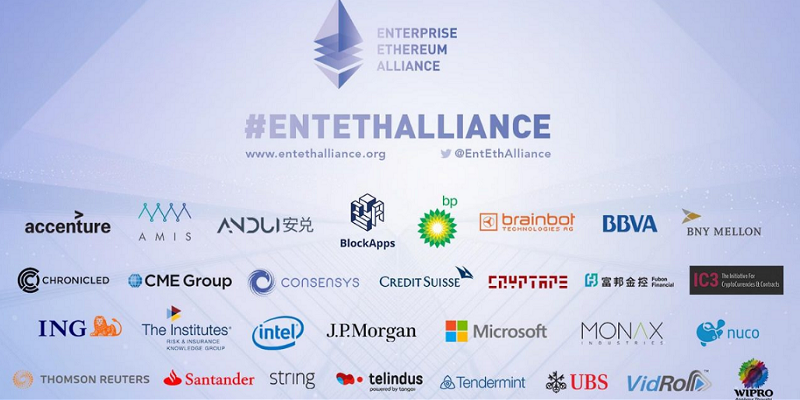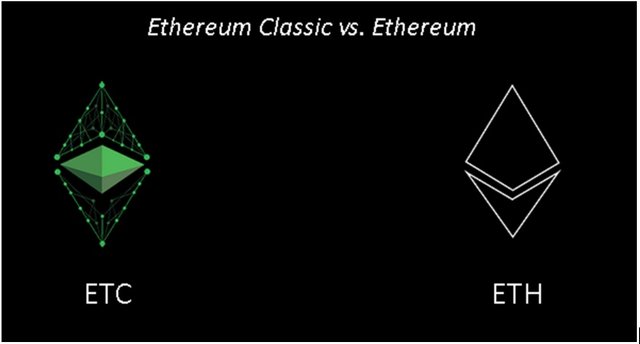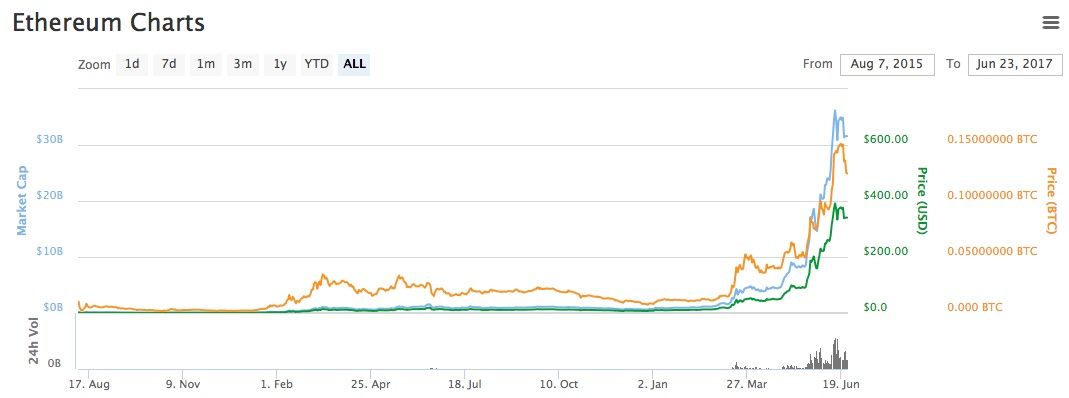Ethereum Rising: What You Need to Know About Ether

Newbies in the crypto-world, this one is for you. Most of you just figured out what a bitcoin is only to find out that there are hundreds of cryptocurrencies out there all vying for relevance. Ethereum is currently the number 2 crypto in terms of market cap but what makes it any different from Bitcoin?
Bitcoin may be the first cryptocurrency to get our attention but hundreds of clones of the Bitcoin technology have emerged and one in particular, a blockchain solution named Ethereum is looking like it's about to take the top spot away from Bitcoin.
Majority of the Bitcoin clones do pretty much the same thing as Bitcoin; they facilitate the storage and sending of value across the world however a number of the new cryptocurrencies on the market bring provide functions that Bitcoin does not, the most popular being smart contracts.
Smart Contracts
While Bitcoin's design concentrates on making payments, Ethereum is designed for the execution of smart contracts i.e conditional payments. This means that you can set up your payments to release automatically when a certain condition is met. Ethereum is able to make this happen because its blockchain is built on what is known as the Ethereum Virtual Machine which allows much more flexibility in coding around payments. In fact, Ethereum was designed a platform to allow this to happen rather than simply processing transactions. Put simply, Ethereum is the world's first distributed global computer.
Each contract coded on the Ethereum network requires resources to execute. In the Ethereum Virtual Machine, this is paid for in tokens called ether, Ethereum's native currency.
Public Acceptance
Bitcoin gained attention for all the wrong reasons in its early years. Its association with drug-dealing, ransomware and money-laundering made it a pariah to governments and reputable institutions worldwide and it was even banned for a while in countries such as India and Russia. The user-cases of Bitcoin were far from inspiring however the technology cannot be ignored. The first one through the door always gets shot and Bitcoin was riddled with bullets however it took one for the team and the rest of the cryptocurrencies in the market do not suffer from the same bad media.
Putin himself met with Vitalik Buterin, the teenage wonderkid who created Ethereum which shows a positive shift in attitude from country that was so quick to ban blockchain iterations. Vitalik and Putin met at St. Petersburg's International Economic Forum in a move that suggests Russia may be interested in leading the world when it comes to blockchain solutions. Putin stated that "the digital economy is not a separate industry, it's essential to the foundation for creating brand-new business models."
The Kremlin isn't the only big gun to give Ethereum vocal support. The Singapore government, for example, is using Ethereum's blockchain as a testing space to see if they can design their own national cryptocurrency. Japan recently became the first nation to accept cryptocurrencies as a valid form of payment. Even big firms like Microsoft and Toyota made it clear that they support Ethereum by joining an organization known as the Enterprise Ethereum Alliance.
Ethereum vs. Ethereum Classic
The path to success now looks clear for Ethereum however 2016 was a tough year for Ethereum after one of the most dramatic events to rock the cryptocurrency world since the collapse of Mt. Gox.
Back in April of 2016 the Decentralized Autonomous Agency (DAO) was formed. The aim of this organization was to create a smart contract that would allow the DAO to raise funds from the public in exchange for DAO tokens which gave them a stake in the organization. This crowdsale amassed over $150 million worth of ether to become the largest cryptocurrency crowdsale at the time. The DAO was ecstatic about the results but fate had other plans for them.
A critical bug was found in the code for the DAO's smart contracts. Experts were quick to assure the public that the funds in the DAO's crowdsale account were secure but that turned to be false because a hacker or group of hackers known as the Robin Hood Group exploited the bug and drained 70% of the DAO's ether before protocol-level action saved the remaining 30%.
Such a theft could not be ignored and numerous solutions were suggested. One thing that you must understand about blockchains is that any changes to the code must be agreed upon by close to 100% of the network users. A simple majority is not enough. A soft fork, or a slight change to the code, was agreed upon however it proved to be insufficient in dealing with the crisis caused by the Robin Hood Group. The only solution left was a hard fork which would split the blockchain in two, fix the code, return the stolen funds and make it so that such a theft could never happen again.
A hard fork was implemented, a new chain was created, the old chain was abandoned and the DAO got their funds back. The general belief was that the old blockchain would die out but it didn't. People who opposed the idea of any transactions being reversed continued to mine the old chain, which in effect created two separate chains. The new chain in which the DAO's funds were returned is what we now call Ethereum and the old chain in which the DAO's funds remain stolen is now known as Ethereum Classic. The Ethereum Classic community originally blocked the funds stolen by the hacker but decided to unfreeze them, fixed the code and carried on, confident in their belief that code is law.
Right now, Ethereum Classic is still one of the top ten cryptocurrencies and commands a market cap of over $2 billion.
Taking Over the Market
2017 is being hailed as the year of the altcoins. Hundreds of new cryptocurrencies that were previously dismissed by bitcoin enthusiasts as 'crap coins' started to gain acceptance and pushed Bitcoin's domination of the market from 90% in 2016 to 37% a year later. Right now, bitcoin has a market cap of $42 billion and Ethereum's is $34 billion but catching up fast. This year alone the value of a single Ether token has jumped from $8 in January to a high of $400 in June. At this rate, Ethereum will be the first token to take over bitcoin's crown as the King of the Cryptos.




Great read. Super informative!
Cheers.
This is a good overview of the Etherium wing of the blockchain space. You get my vote.
Just doing my part to raise crypto-awareness